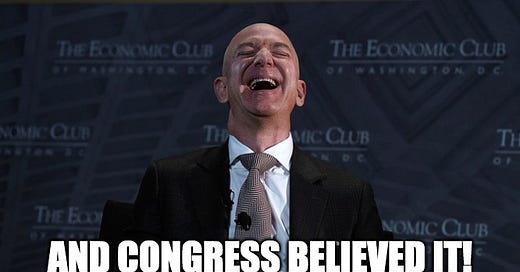Visible Hands: In Antitrust We Trust?!
There’s no sports right now unless you count marblympics, so let’s look at competition in another light. Primary subject: Amazon.

There’s no sports right now unless you count marblympics, so let’s look at competition in another light. Primary subject: Amazon.
The Wall Street Journal reported this week that Amazon’s employees have used independent seller data, gathered on Amazon’s platform, to come up with and sell competing products. Like how Amazon knew the total sales, the costs of marketing and shipping and Amazon’s profit from a specific vendor’s product and then introduced its own version of the product. Amazon responded by saying they have launched an internal investigation.
This WSJ discovery, from interviews with over 20 former Amazon private-label business employees and from numerous documents, is at odds with what Amazon has asserted to Congress.
In July of 2019, Amazon came before the House Antitrust subcommittee and told Congress that it used aggregated data to come up with its own products, not individual third-party seller data. You can find their full responses here.

This new information could open up a case on whether Amazon’s abused its dominance and engaged in anti-competitive behavior. Sen. Josh Hawley wrote a letter to Attorney General William Barr this Tuesday urging a criminal antitrust investigation into Amazon. One open question: how do you determine market dominance? Amazon by recent numbers “only” makes up ⅓ of e-commerce. Counterpoint: it’s got a $1.15 trillion market cap (only Microsoft and Apple are larger) and dominates subcategories of its sector.
In recent years, the debate around antitrust in the U.S. has often been reduced to whether consumers are better off. This paper from Haas traces that by the mid-1980s, the Supreme Court ruled out that predatory pricing made business sense, because it was so unlikely that predators could sustain a future monopoly long enough. And supporters of large tech companies say that digital companies don’t actually benefit from their monopolies, as compared to traditional monopolistic players in the oil and gas industry. There are no marginal costs and thus there aren’t diminishing returns to scale (things actually get more efficient as technology scales).

But other experts disagree with that take. Lina Khan writes in the Yale Law Journal’s “Amazon’s Antitrust Paradox” that platforms operate differently and predatory pricing actually becomes “highly rational” -- and leads to benefits only in the short-term for the consumer. Further, it’s a myth that Amazon’s always cheaper and thus better for the consumer. It depends on what’s in your basket. Amazon can create their brand’s “price image” as being extremely affordable through pricing the most popular items that people buy at a low, low price. But then it can up the cost on the rest if it so chooses. In one comparison, products were compared between different retailers and Walmart was more than 10% cheaper than Amazon. In another, Amazon was found to slash the cost of TVs, but increased the cost on affiliated cords (under the assumption that people price shop more for big ticket items).
If you aren’t already concerned, here is more Amazon news you may want to see:
Amazon Given €294m in Tax Credits as European Revenues Jump to €32bn
Amazon Workers Protest Termination of Unlimited Unpaid Time Off Policy
Amazon Loses Appeal of French Order to Stop Selling Nonessential Items

As a consumer:
It’s really, really hard right now to avoid Amazon with the pandemic. But with the Amazon worker walkout this Friday (May 1 aka International Workers' Day), consider supporting the workers by sending a message that consumers are behind the labor movement.
As an employee:
The employees who came forward to the WSJ did an incredibly brave act. Lots of media organizations have encrypted methods of communication to protect anonymity. Here’s the guide for the San Francisco Chronicle for reference; including tips on Signal and SecureDrop.
As an investor:
Amazon’s proxy statement is publicly available, and their shareholder meeting is in May. The company has signaled that they want to vote AGAINST all shareholder proposals on the docket, including asks for reports on potential customer misuse of technologies, greater gender and racial pay gap transparency, and additional corporate lobbying disclosure. Uh...what?! If you are currently an Amazon shareholder, please take the time to read the proposals and vote!
As a citizen:
Eleven senators as of September 2019 were investors in Amazon (with between $423,000 and $1.3m invested). A year ago, Senators Merkeley and Brown tried to pass a law prohibiting members of Congress from owning individual securities. That didn’t quite work out.

USDA Let Millions of Pounds of Food Rot While Food-Bank Demand Soared
The Causal Effect of Job Loss on Health: The Danish Miracle?
American billionaires Have Gotten $280 Billion Richer Since the Start of the COVID-19 Pandemic
Sen. Richard Burr Is Not Just a Friend to the Health Care Industry. He’s Also a Stockholder.
Stay connected with us through Instagram, Medium, our new Twitter, and, of course, email (visiblehandsmedia@gmail.com)! Please invite any friends, roommates, coworkers, armchair activists, and small business owners crushed by Amazon to join the movement.




